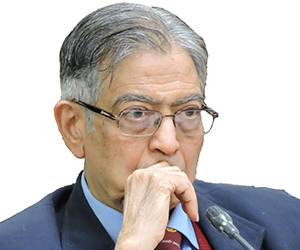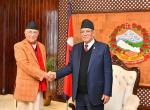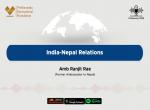Prime Minister’s visit to Bangladesh from September 6th to 7th was a once in a life time opportunity to place India-Bangladesh ties on an irreversibly upward trajectory. The imperative for seizing this opportunity at the earliest arises from the fact that the term of Sheikh Hasina’s Awami League government, which shares this sentiment, runs out in only a little more than two years and Khaleda Zia’s Bangladesh National Party which may well replace it has historically not been well disposed towards India. The latter has, in fact, been vigorously opposing all the moves made by the Awami League government so far to address our most critical concerns on issues like terrorism, connectivity and fundamentalism.
Any perception in Bangladesh of a lack of Indian sincerity in addressing its concerns, particularly after Sheikh Hasina has been so forthcoming in addressing India’s concerns, will not only jeopardize the pace of further cooperation between the two countries but will also undermine Sheikh Hasina’s chances of returning to power, thereby placing at risk all that has so far been accomplished in the relationship.
Accordingly, the failure to conclude the Teesta water sharing agreement with Bangladesh during the visit constitutes a huge setback to the efforts to progress the relationship as the issue is highly emotive and constitutes a critical concern in that country. Furthermore, it shows up India in a very poor light as all the details for conclusion of this agreement had been finalized between the two sides and we backtracked at the very last minute due to Mamata Bannerjee’s intransigence. This is yet another instance where the Prime Minister has shown an apalling lack of leadership. This is one issue where he could and should have stood firm and concluded the accord particularly as Mamata had all along been in the loop. Regrettably, he failed to display even a fraction of the tenacity he had exhibited in pushing through the nuclear deal and the composite dialogue process with Pakistan in the face of great opposition. But, perhaps, one is expecting too much of him as on matters of much greater import, like corruption and national security, he has shown a singular lack of spine!
The disappointment with our backtracking on the Teesta accord has been massive and widespread in Bangladesh. The skepticism quotient in Bangladesh about India which had been brought down to manageable proportions due to the constructive approach adopted by negotiators on both sides has once again ballooned and it will take some doing to repair the trust deficit. In concrete terms India has taken a hit as neither the extradition treaty nor many of the connectivity issues on which we were so keen like the MOU on the Akhaura-Agartala rail link, modalities for use of Mongla and Chittagong ports, movement of containerized cargo by rail, etc find mention amongst the documentation signed during the visit though there are, of course, indications of intent in regard to them in the Joint Statement. It is not inconceivable that Bangladesh peeved at our intransigence on Teesta retaliated by holding up on matters of particular interest to us.
Of course, there is no denying that there have been many positives in the visit. As pointed out in the Prime Minister’s press statement a “new architecture” for the relationship has been created through the conclusion of the Framework Agreement on Cooperation for Development which constitutes “a contemporary blueprint designed to encompass all forms and sectors of cooperation.” Equally important has been the conclusion of the Protocol to the Land Boundary Agreement of 1974 which sets in place the modalities to giving effect to the latter thereby finally settling the borders of the two countries. Arrangements were also agreed upon to provide 24-hour access to the enclaves of Dahagram-Angarpota through the Tin Bigha Corridor thereby meeting the long standing demands of the people living in the area. Another very positive move on our part was the removal of all 46 textile items from the negative list thereby reducing customs duty thereon to zero. In addition 8 MOUs were signed on diverse issues ranging from cooperation on fisheries to conservation of the Sunderbans and from renewable energy cooperation to mutual broadcast of television programmes. Due credit must also be given to our government for announcing some imaginative measures like the construction of an India-Bangladesh cultural centre in Dhaka, the setting up of an IT lab in a model school in every district in Bangladesh, grant of scholarships at graduate and post graduate level etc
Thus the Prime Minister’s Bangladesh visit was by no means a non event and has certainly served to further improve India-Bangladesh ties. But by failing to come up with the Teesta accord, to concretise the modalities of connectivity, and to achieve a symbiotic interweaving of linkages leading to mutually beneficial interdependencies between the two countries, the visit was not a transformational event irretrievably placing India-Bangladesh ties on a much higher plane insulated from the vagaries of regime change. It is true that the Framework Agreement on Cooperation for Development could, in time, achieve such linkages. But it is for the moment only a declaration of intent and can like the 1974 Land Boundary Agreement take decades to implement. It is for this reason that one had hoped that the visit could have resulted in agreements on the joint management of common rivers like the Brahmaputra, interlocking of the electricity grids of the two countries, joint management of the border posts of the two countries together with joint patrolling, conclusion of a comprehensive economic cooperation agreement between the two countries aimed at a deeper integration of the two countries inter alia entailing elimination of non tariff barriers, negative lists and quotas, and freer flow of investments, etc.
-------------------------------------------------
Published Date: 12th September, 2011










Post new comment